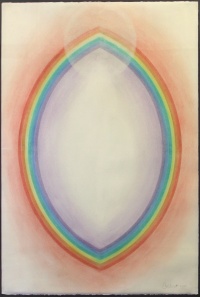Mandorla (art work): Difference between revisions
Jump to navigation
Jump to search
(Created page with "right|200px "Mandorla" is a pastel created by Burton Callicott, a member of the Memphis Lodge of the Theosophical Society in America. ...") |
No edit summary |
||
| Line 1: | Line 1: | ||
[[ | [[File:Callicott Mandorla 1.jpg|right|200px]] | ||
"Mandorla" is a pastel created by [[Burton Callicott]], a member of the Memphis Lodge of the [[Theosophical Society in America]]. It hangs outside the Meditation Room in the [[L. W. Rogers Building]], the headquarters of the TSA in Wheaton, Illinois. The sign below the frame states, | "Mandorla" is a pastel created by [[Burton Callicott]], a member of the Memphis Lodge of the [[Theosophical Society in America]]. It hangs outside the Meditation Room in the [[L. W. Rogers Building]], the headquarters of the TSA in Wheaton, Illinois. The sign below the frame states, "Represents the human aura as an almond-shaped rainbow of the seven human principles. At the top is the white light of atma, in the center - pure emptiness, the holy void from which all comes forth." | ||
The artist donated the work in the year 2000, when he was 93 years old, along with another work, "Antahkarana." | |||
The [[mandorla]] is a symbol in many cultures and religions, and the name derives from the Italian word for almond. | |||
The | |||
Revision as of 16:55, 29 January 2012
"Mandorla" is a pastel created by Burton Callicott, a member of the Memphis Lodge of the Theosophical Society in America. It hangs outside the Meditation Room in the L. W. Rogers Building, the headquarters of the TSA in Wheaton, Illinois. The sign below the frame states, "Represents the human aura as an almond-shaped rainbow of the seven human principles. At the top is the white light of atma, in the center - pure emptiness, the holy void from which all comes forth."
The artist donated the work in the year 2000, when he was 93 years old, along with another work, "Antahkarana."
The mandorla is a symbol in many cultures and religions, and the name derives from the Italian word for almond.
